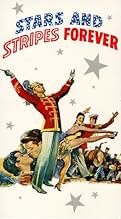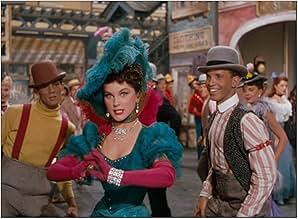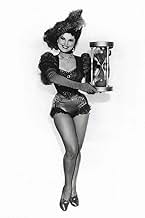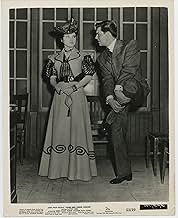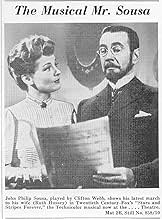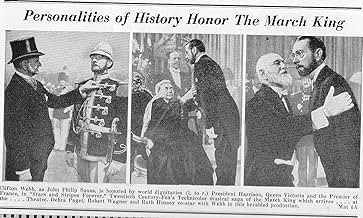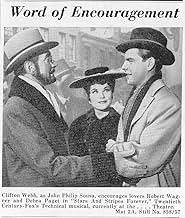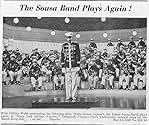IMDb RATING
7.1/10
1K
YOUR RATING
A film biography of the composer John Philip Sousa, from his early days in the Marine Corps Band through the Spanish-American War in 1898.A film biography of the composer John Philip Sousa, from his early days in the Marine Corps Band through the Spanish-American War in 1898.A film biography of the composer John Philip Sousa, from his early days in the Marine Corps Band through the Spanish-American War in 1898.
- Director
- Writers
- Stars
- Awards
- 3 nominations total
Thomas Browne Henry
- David Blakely
- (as Tom Browne Henry)
Frank Ferguson
- Mr. Wells
- (scenes deleted)
Aladdin
- Orchestra Conductor
- (uncredited)
- …
Bill Alcorn
- Specialty Dancer
- (uncredited)
Sharon Jan Altman
- Helen Sousa
- (uncredited)
Jon Andrews
- Minor Role
- (uncredited)
John Baer
- Chorus Boy at 'El Capitan' Rehearsal
- (uncredited)
Barbara Bailey
- Dancer
- (uncredited)
Patricia Barker
- Minor Role
- (uncredited)
Alvin Beam
- Minor Role
- (uncredited)
Bobker Ben Ali
- Reporter
- (uncredited)
- Director
- Writers
- All cast & crew
- Production, box office & more at IMDbPro
Featured reviews
This picture is always a sempar fidelis-It's always faithful when viewing. It is certainly a rousing tribute to the march king-John Philip Sousa.
The film takes us from the career of Sousa is the Marine Marching band to life afterward. Interesting that he served 5 presidents during his tenure with the marines.
Robert Wagner and Debra Paget play the couple who worked with Sousa in his band and married. The film briefly relates how they thought they'd keep their marriage a secret from Sousa. Wagner made his film debut the same year as this film in the other rousing "With A Song in My Heart." He certainly got experience with crutches in both films. Paget, will forever be remembered as Lilia, the water-girl in the epic "The 10 Commandments." Ironically, her name in this film was Lily as well.
The music was excellently staged and Clifton Webb was in fine form as Sousa. Why? It always seemed that Webb, a fine actor, was always a perfectionist in his films. This film was certainly no exception.
Again, a definitely rousing tribute to a great American. Ruth Hussey, who played Webb's wife in the film, was totally subordinate here. That's how the lifestyle was in the 1890s.
The film takes us from the career of Sousa is the Marine Marching band to life afterward. Interesting that he served 5 presidents during his tenure with the marines.
Robert Wagner and Debra Paget play the couple who worked with Sousa in his band and married. The film briefly relates how they thought they'd keep their marriage a secret from Sousa. Wagner made his film debut the same year as this film in the other rousing "With A Song in My Heart." He certainly got experience with crutches in both films. Paget, will forever be remembered as Lilia, the water-girl in the epic "The 10 Commandments." Ironically, her name in this film was Lily as well.
The music was excellently staged and Clifton Webb was in fine form as Sousa. Why? It always seemed that Webb, a fine actor, was always a perfectionist in his films. This film was certainly no exception.
Again, a definitely rousing tribute to a great American. Ruth Hussey, who played Webb's wife in the film, was totally subordinate here. That's how the lifestyle was in the 1890s.
What should be understood is that Stars and Stripes Forever is in no way a full biography of the famous March King which was the nickname given to John Philip Sousa. It is rather a portrait of the era known as the Gay Nineties in America where Sousa first achieved his reputation and prominence. Also included is a romance between fictional characters played by Robert Wagner and Debra Paget.
In that beard with those pince nez glasses, Clifton Webb looks remarkably like John Philip Sousa in that period and by reputation, Sousa was as much a dilettante as Webb normally played on screen which made him perfect casting. After leaving the Marine Corps band, Sousa formed his own orchestra which became world famous and toured the globe well into the Twenties.
But our story concerns Sousa the March King. Though he composed all kinds of music, it is his marches that have come down today and have given him his reputation. The Marine Corps official march, Semper Fidelis, was composed by Sousa and the incident involving President Benjamin Harrison as depicted in Stars and Stripes Forever is somewhat true. The Marine Corps Band was playing at a White House reception and the Harrison who was not the most social of presidents ordered Sousa to speed up the tempo so the receiving line would move at a brisk pace.
Ruth Hussey is cast in the Myrna Loy type role of the perfect understanding mate for her genius husband and she fulfills the role admirably. Even Clifton Webb does make you forget you're watching Clifton Webb and you do think you are seeing the real Sousa.
Stars and Stripes Forever is an admirable film and of course the finale does have several bands and marching armed forces personnel playing and marching to Sousa's most famous composition.
In that beard with those pince nez glasses, Clifton Webb looks remarkably like John Philip Sousa in that period and by reputation, Sousa was as much a dilettante as Webb normally played on screen which made him perfect casting. After leaving the Marine Corps band, Sousa formed his own orchestra which became world famous and toured the globe well into the Twenties.
But our story concerns Sousa the March King. Though he composed all kinds of music, it is his marches that have come down today and have given him his reputation. The Marine Corps official march, Semper Fidelis, was composed by Sousa and the incident involving President Benjamin Harrison as depicted in Stars and Stripes Forever is somewhat true. The Marine Corps Band was playing at a White House reception and the Harrison who was not the most social of presidents ordered Sousa to speed up the tempo so the receiving line would move at a brisk pace.
Ruth Hussey is cast in the Myrna Loy type role of the perfect understanding mate for her genius husband and she fulfills the role admirably. Even Clifton Webb does make you forget you're watching Clifton Webb and you do think you are seeing the real Sousa.
Stars and Stripes Forever is an admirable film and of course the finale does have several bands and marching armed forces personnel playing and marching to Sousa's most famous composition.
John Philip Sousa's position in American (and World) music is set in stone by now. Others have composed great marches (the English composer Edward Elgar with his four "Pomp and Circumstance Marches" for instance, two of which are memorable), and such major composers like Wagner and Mendelsohn. But Sousa remains the "March King". Like Johann Strauss the Younger, Alexander Scarlatti, and Scott Joplin, he is recalled for his domination of a single area of music: marches in this case, rather than waltzes, sonatas, or "rags". But this really does not explain why he remains the "March King". There is a sense of fun and spirit in Sousa's marches that transcend what a march is usually supposed to do.
Marches were originally meant for troops to walk in step either on a training field or on the battlefield (music was used until the end of the 19th Century to keep up the spirits of the soldiers, and even to help orchestrate the speed they were to fight at when running across the battlefield). Sousa came from a musical family (his father was a musician in the Marine Corps band). Sousa followed in his father's footsteps, but played several instruments and rose to be the bandmaster. He began composing pieces for the Marine Corps Band, such as "Semper Fidelis", "The Washington Post March", "Manhattan Beach", and he tried to expand his abilities into other fields. When he left the Marine Corps, he formed his own band, which he developed with a perfect balance of brass, stings, percussion, and woodwinds. His band would go around the world performing, not only his own pieces, but also other composers as well.
The movie does touch, once or twice, on Sousa's attempts to broaden his musical ability by doing Broadway shows (operettas). At the start Clifton Webb, as Sousa, does play the melody of "Semper Fidelis" for his wife Jenny (Ruth Hussey) as a tune to be sung. It doesn't quite work. He would do a successful operetta (which is still revived) called EL CAPITAN, which starred DeWolf Hopper (we hear an actor as Hopper singing a tune at a rehearsal during the movie). However, EL CAPITAN had a book by Charles Klein, a major dramatist of the 1890s - 1915 (he drowned in the Lusitania disaster). Klein was not a W. S. Gilbert, but his libretto was serviceable. Unfortunately Sousa never had another librettist/lyricist like Klein, and spent the rest of his career seeking his "Gilbert". As a result the leading operetta composer from the U.S. in Sousa's lifetime (and since) was Victor Herbert.
Sousa was talented in other ways too. He sometimes wrote clever lyrics to comic songs, such as "A Typical Song of Zanzibar". He wrote about five comic novels too. He designed the special marching tuba, the "Sousaphone" (which is shown in the film being designed by Webb and Robert Wagner). But it is the string of great marches that he left which are his great donation to our culture. The reason is more than just his gift for melodious music. He was a genius at composition and orchestration - probably the best orchestrator among the major American composers.
His best remembered march is the title march for this film: THE STARS AND STRIPES FOREVER. The film mentions how Sousa, on a trip for his health, was walking the deck of the liner at night and thought of the beat of the music. We hear Webb describing the moment (quoting a passage from Sousa's memoirs, MARCHING ALONG), and the film ends with the playing of the great march. The film does not mention that that Sousa also composed words to be sung to it (which occasionally still are sung). A few years ago, the U.S. Congress formally adopted THE STARS AND STRIPES FOREVER as the national march.
I have gone into a great deal of detail regarding Sousa and his career, for the movie (for a biography) skims a lot. His literary efforts are not dealt with, and the film ends (really) with the playing of THE STARS AND STRIPE FOREVER. That was in 1899. Sousa would live until 1932, and would be a public figure until then. He was still composing until the 1920s.
Webb had an extensive musical comedy career in the 1920s and 1930s (he was one of the stars in Irving Berlin's AS THOUSANDS CHEER, for example). But aside from an occasional tune he sings like "When I wore a Tulip" or a dance he does with Jeanne Craig in CHEAPER BY THE DOZEN, he never did a musical. STARS AND STRIPES FOREVER is his one "musical film". He is credible as Sousa, but the film never really goes deeply into the great man. The dramatic portions are handled by Robert Wagner and Deborah Paget as friends and lovers, whose love affair is twisted for awhile by the Spanish American War. The film is certainly watchable (the cast is game, and the music is first rate) but it is not a showcase for Webb's talents in musicals. Ironically he could have been in Vincent Minelli's THE BANDWAGON with Fred Astaire and Cyd Charisse, but opted for the lead as Sousa. Probably a bad decision - but it is hard to say. Every July 4th STARS AND STRIPES FOREVER is shown for it's great holiday music. What we lost in not seeing Webb opposite Astaire is not enough to prevent our still seeing Webb as the great maestro composer.
Marches were originally meant for troops to walk in step either on a training field or on the battlefield (music was used until the end of the 19th Century to keep up the spirits of the soldiers, and even to help orchestrate the speed they were to fight at when running across the battlefield). Sousa came from a musical family (his father was a musician in the Marine Corps band). Sousa followed in his father's footsteps, but played several instruments and rose to be the bandmaster. He began composing pieces for the Marine Corps Band, such as "Semper Fidelis", "The Washington Post March", "Manhattan Beach", and he tried to expand his abilities into other fields. When he left the Marine Corps, he formed his own band, which he developed with a perfect balance of brass, stings, percussion, and woodwinds. His band would go around the world performing, not only his own pieces, but also other composers as well.
The movie does touch, once or twice, on Sousa's attempts to broaden his musical ability by doing Broadway shows (operettas). At the start Clifton Webb, as Sousa, does play the melody of "Semper Fidelis" for his wife Jenny (Ruth Hussey) as a tune to be sung. It doesn't quite work. He would do a successful operetta (which is still revived) called EL CAPITAN, which starred DeWolf Hopper (we hear an actor as Hopper singing a tune at a rehearsal during the movie). However, EL CAPITAN had a book by Charles Klein, a major dramatist of the 1890s - 1915 (he drowned in the Lusitania disaster). Klein was not a W. S. Gilbert, but his libretto was serviceable. Unfortunately Sousa never had another librettist/lyricist like Klein, and spent the rest of his career seeking his "Gilbert". As a result the leading operetta composer from the U.S. in Sousa's lifetime (and since) was Victor Herbert.
Sousa was talented in other ways too. He sometimes wrote clever lyrics to comic songs, such as "A Typical Song of Zanzibar". He wrote about five comic novels too. He designed the special marching tuba, the "Sousaphone" (which is shown in the film being designed by Webb and Robert Wagner). But it is the string of great marches that he left which are his great donation to our culture. The reason is more than just his gift for melodious music. He was a genius at composition and orchestration - probably the best orchestrator among the major American composers.
His best remembered march is the title march for this film: THE STARS AND STRIPES FOREVER. The film mentions how Sousa, on a trip for his health, was walking the deck of the liner at night and thought of the beat of the music. We hear Webb describing the moment (quoting a passage from Sousa's memoirs, MARCHING ALONG), and the film ends with the playing of the great march. The film does not mention that that Sousa also composed words to be sung to it (which occasionally still are sung). A few years ago, the U.S. Congress formally adopted THE STARS AND STRIPES FOREVER as the national march.
I have gone into a great deal of detail regarding Sousa and his career, for the movie (for a biography) skims a lot. His literary efforts are not dealt with, and the film ends (really) with the playing of THE STARS AND STRIPE FOREVER. That was in 1899. Sousa would live until 1932, and would be a public figure until then. He was still composing until the 1920s.
Webb had an extensive musical comedy career in the 1920s and 1930s (he was one of the stars in Irving Berlin's AS THOUSANDS CHEER, for example). But aside from an occasional tune he sings like "When I wore a Tulip" or a dance he does with Jeanne Craig in CHEAPER BY THE DOZEN, he never did a musical. STARS AND STRIPES FOREVER is his one "musical film". He is credible as Sousa, but the film never really goes deeply into the great man. The dramatic portions are handled by Robert Wagner and Deborah Paget as friends and lovers, whose love affair is twisted for awhile by the Spanish American War. The film is certainly watchable (the cast is game, and the music is first rate) but it is not a showcase for Webb's talents in musicals. Ironically he could have been in Vincent Minelli's THE BANDWAGON with Fred Astaire and Cyd Charisse, but opted for the lead as Sousa. Probably a bad decision - but it is hard to say. Every July 4th STARS AND STRIPES FOREVER is shown for it's great holiday music. What we lost in not seeing Webb opposite Astaire is not enough to prevent our still seeing Webb as the great maestro composer.
Having spent 6 years in orchestras and marching bands before graduating from high school, often playing Sousa's best known marches, I anticipated this partial biographical film. Clifton Webb does indeed come across as the real Sousa and certainly appears much younger than his 60+ years. He much reminds us of Frank Gilbreth in "Cheaper by the Dozen", another perfect role for him. The inclusion of the fabricated young couple played by Robert Wagner and Debra Paget was understandable, serving to lighten things up from time to time as contrasted to Sousa's rather starchy exterior. However, they come across as basically a '50s show biz couple interjected into an 1890s historical film. I was disappointed that more of Sousa's best known marches were not featured, nor the background of how he came to compose some of them revealed. After all, he did compose more than 100 marches, of which at least 8 should be recognized by every American as classics. In addition to "The Washington Post", "Semper Fidelis" and "The Stars and Stripes Forever" prominently featured in the film, "The Thunderer", "The Liberty Bell", "King Cotton", "El Capitan" and "The Corcoran Cadets March" should be instantly recognizable. In the film, we briefly see Sousa on a ship talking to himself about an idea for a classic march. But, we never find out that it is Christmas day, he is on a ship bound from Europe to America and is composing "The Stars and Stripes Forever" in his head. Also, it could have been brought out that his popular march "The Liberty Bell" was due to have quite a different name. However, after he saw a large backdrop of the Liberty Bell and coincidentally received a letter from his wife saying his son was marching in a parade honoring the Liberty Bell, he changed his mind. Sousa's opposition to recording his band and to radio broadcasts of his band could have been brought out(True, radio broadcasting had not been invented during the time period covered). Although he did allow many recordings of the Marine Band around 1890, he later became strongly opposed to recordings of his own band until very late in his career. In this resistance to new electronic technologies that allowed many unseen people to enjoy his music whenever they wished, he was in sympathy with Irving Berlin.
Sousa was not quite the one-dimensional genius popularly supposed. The film brings out to some extent his ambition to be a composer for the musical stage. He also composed several novels. The film could have also brought out the fact that Sousa was recognized as one of the top trap shooters in the world and initiated a national organization for trap shooters.
Sousa's name and origins were a subject for speculation. Several sources claimed that he was from various European countries and that Sousa was a stage name, the "usa" part representing "USA", his adopted country. Im fact, he was born and raised in Washington, D.C., his father being a member of the Marine Band. His ancestry is mostly Portuguese and Bavarian, Sousa being a rather common Portuguese and Spanish name. Variant spellings include d'Souza, Soza and Sosa.
One of film's highlights is the defiant appearance of his marching band in a southern city after notification that it's booking had been canceled due to popular opposition. I don't know if this incident has any factual basis, but Sousa's music and band are depicted as seen by many southerners as a purely Yankee institution. We see the faces of a group of African Americans when "The Battle Hymn of the Republic" is played, but I wonder what the reaction of the typical Caucasian southerner would have been. This inspirational Civil War favorite was in fact an unintentional collaboration between South Carolinian William Steffe, who composed the tune shortly before the Civil War, and unionist Julia Ward Howe, who provided the lyrics, one of various lyrics sung to this tune in both the North and South. Thus, it might have been interpreted as a unifying symbol.
Sousa was not quite the one-dimensional genius popularly supposed. The film brings out to some extent his ambition to be a composer for the musical stage. He also composed several novels. The film could have also brought out the fact that Sousa was recognized as one of the top trap shooters in the world and initiated a national organization for trap shooters.
Sousa's name and origins were a subject for speculation. Several sources claimed that he was from various European countries and that Sousa was a stage name, the "usa" part representing "USA", his adopted country. Im fact, he was born and raised in Washington, D.C., his father being a member of the Marine Band. His ancestry is mostly Portuguese and Bavarian, Sousa being a rather common Portuguese and Spanish name. Variant spellings include d'Souza, Soza and Sosa.
One of film's highlights is the defiant appearance of his marching band in a southern city after notification that it's booking had been canceled due to popular opposition. I don't know if this incident has any factual basis, but Sousa's music and band are depicted as seen by many southerners as a purely Yankee institution. We see the faces of a group of African Americans when "The Battle Hymn of the Republic" is played, but I wonder what the reaction of the typical Caucasian southerner would have been. This inspirational Civil War favorite was in fact an unintentional collaboration between South Carolinian William Steffe, who composed the tune shortly before the Civil War, and unionist Julia Ward Howe, who provided the lyrics, one of various lyrics sung to this tune in both the North and South. Thus, it might have been interpreted as a unifying symbol.
When this movie was released it was the climax of one of those dreaded days when I had to accompany my mother on a downtown Boston, Massachusetts, shopping trip. I was never aware if my having to tag along was because she couldn't find a babysitter or because she wanted a little companionship, however young and immature, as she searched for a few things to update the family's wardrobe. By the time our trek through several department stores had bored me almost to the point of rebellion, we found ourselves entering the Mayflower Theater and I soon sat fascinated as this Technicolor treat unspooled before my amazed eyes. Even then I knew I wasn't seeing an historically accurate recreation of the life and times of the famous Mr. Sousa, whose music was familiar to me because of my father's enthusiasm for it. (He had played trumpet in his high school band.) But I knew I was seeing a glowingly colorful example of what Hollywood could do to entertain an audience in the mood for some patriotism, however jingoistic, with a touch of romantic flim-flam thrown in.
20th-Century Fox trowelled on the Technicolor; cast Ruth Hussey and Clifton Webb as about the most compatible-seeming mature couple one could imagine; assigned the ever-reliable Alfred Newman to supervise the music, which he did magnificently; and allowed two of its young up-and-comers, Robert Wagner and Debra Paget, to supply a little frosting on the cake. The end result thoroughly charmed that weary pre-teenager in 1953 and did, again, when I saw it on a TV broadcast many years later.
I have to confess that I watched it again to catch that absolutely amazing number, "Father's Got 'Em!", performed with energy to burn by the gorgeous Miss Paget in some of the tightest white tights I'd ever seen before or since. It's hilarious and a heck of a lot sexier than the struttings of most of today's so-called "divas."
Since this was a pre-CinemaScope Twentieth product, possibly produced while the three-strip Technicolor process was still in use, the VHS tape transfer may very well look as vividly rich as it did on that big screen so many years ago in Boston.
20th-Century Fox trowelled on the Technicolor; cast Ruth Hussey and Clifton Webb as about the most compatible-seeming mature couple one could imagine; assigned the ever-reliable Alfred Newman to supervise the music, which he did magnificently; and allowed two of its young up-and-comers, Robert Wagner and Debra Paget, to supply a little frosting on the cake. The end result thoroughly charmed that weary pre-teenager in 1953 and did, again, when I saw it on a TV broadcast many years later.
I have to confess that I watched it again to catch that absolutely amazing number, "Father's Got 'Em!", performed with energy to burn by the gorgeous Miss Paget in some of the tightest white tights I'd ever seen before or since. It's hilarious and a heck of a lot sexier than the struttings of most of today's so-called "divas."
Since this was a pre-CinemaScope Twentieth product, possibly produced while the three-strip Technicolor process was still in use, the VHS tape transfer may very well look as vividly rich as it did on that big screen so many years ago in Boston.
Did you know
- TriviaAccording to Paul Bierley's biography of John Philip Sousa, "John Philip Sousa, American Phenomenon", several musicians who had played under Sousa attended the world premiere of the film but walked out in disgust.
- GoofsIn the film the famous Sousaphone was invented by Willy Little. In actuality the first sousaphone was developed by James Welsh Pepper in 1893 at the request of John Philip Sousa.
- Quotes
John Philip Sousa: What in the name of all get out's been keeping you so long?
Jennie Sousa: I was hearing the children's prayers.
John Philip Sousa: Does that take all night?
Jennie Sousa: They were praying for you.
- Crazy creditsDuring the opening display of 20th Century Fox's logo, Sousa's "Semper Fidelis" was played instead of the usual 20th Century fanfare
- Alternate versionsSome releases include at the end a clip of the real John Philip Sousa leading the band in one of his famous marches.
- ConnectionsFeatured in Family Classics: Family Classics: Stars and Stripes Forever (1963)
- SoundtracksSemper Fidelis
(uncredited)
Music by John Philip Sousa (1888)
Played during the opening credits
Also played by the Marine band at the presidential reception
- How long is Stars and Stripes Forever?Powered by Alexa
Details
- Release date
- Country of origin
- Language
- Also known as
- Stars and Stripes Forever
- Filming locations
- Production company
- See more company credits at IMDbPro
- Runtime
- 1h 30m(90 min)
Contribute to this page
Suggest an edit or add missing content

